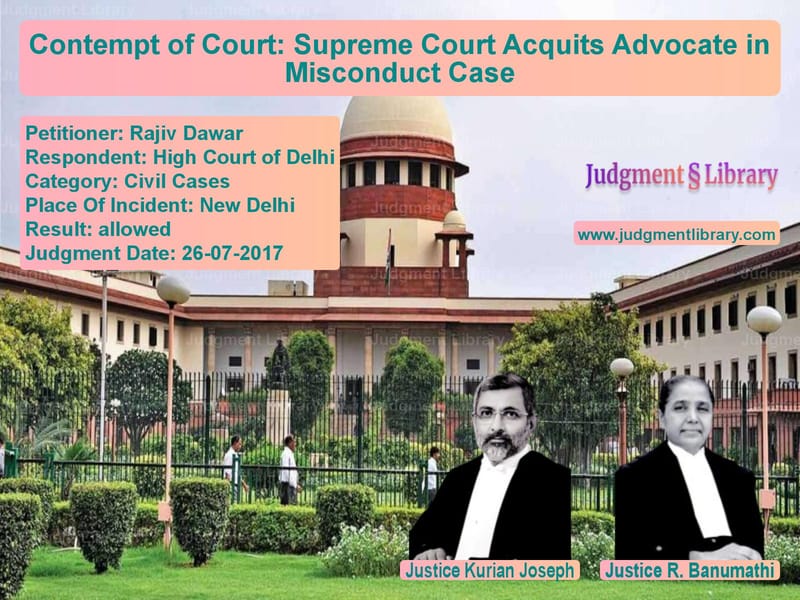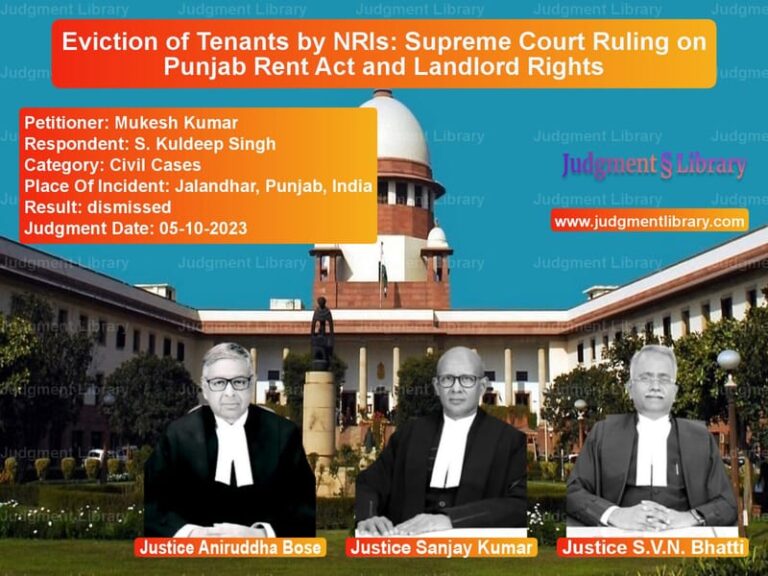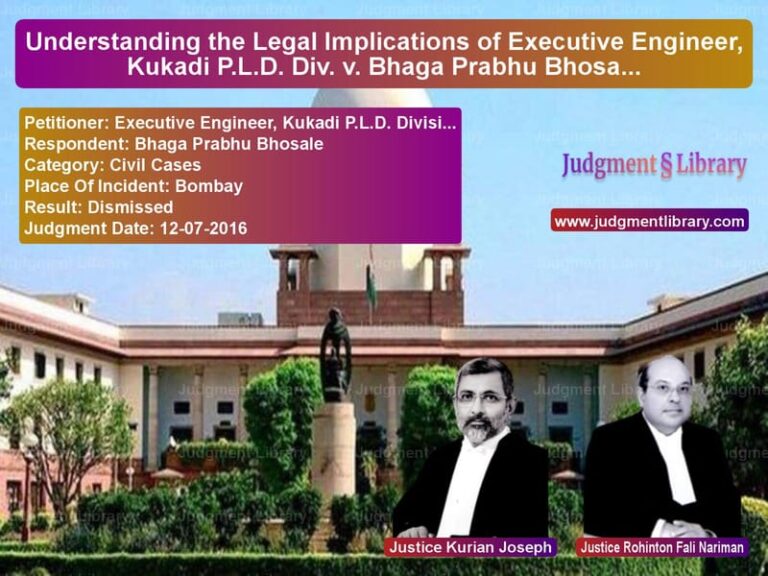Contempt of Court: Supreme Court Acquits Advocate in Misconduct Case
The Supreme Court’s ruling in Rajiv Dawar vs. High Court of Delhi, delivered on July 26, 2017, addressed a contempt of court conviction and professional misconduct allegations against an advocate. The case revolved around whether the advocate, Rajiv Dawar, was denied a fair opportunity to present his defense during contempt proceedings initiated against him. The Supreme Court overturned the conviction and sentence, emphasizing the need for due process and adherence to procedural safeguards.
The appellant, an advocate, was found guilty of contempt of court under Section 2(c) read with Sections 10 and 15 of the Contempt of Courts Act, 1971, and under Article 215 of the Constitution of India. He was fined Rs. 2,000 and suspended from practicing for two months. The Supreme Court ruled that his conviction was based solely on a unilateral complaint, without allowing him the opportunity to cross-examine witnesses or present evidence.
Background of the Case
The case originated from allegations that Rajiv Dawar, an advocate, charged exorbitant fees and withdrew from representing a client in a criminal case under the Narcotic Drugs and Psychotropic Substances (NDPS) Act without rendering adequate legal assistance. The complainant accused Dawar of professional misconduct, stating that he had taken Rs. 7.05 lakhs from him but failed to defend him properly in court.
The key aspects of the case were:
- The Additional Sessions Judge, New Delhi, made a reference to the High Court of Delhi regarding alleged misconduct.
- The High Court initiated contempt proceedings without giving the advocate an opportunity to cross-examine the complainant.
- The Delhi Bar Council investigated the case and found that it was primarily a dispute over legal fees rather than professional misconduct.
- The advocate was convicted and suspended from practice by the High Court.
Arguments by the Petitioner (Rajiv Dawar)
Rajiv Dawar, represented by senior counsel, argued:
- The conviction was based entirely on the allegations of the complainant without any corroborative evidence.
- He was not given a fair chance to cross-examine the complainant or present his side of the story.
- The proceedings lacked adherence to procedural safeguards required in contempt cases.
- The Delhi Bar Council had already ruled that the issue was related to legal fees and did not amount to professional misconduct.
- Since he had already refunded Rs. 4 lakhs to the complainant, there was no basis for the conviction.
Arguments by the Respondent (High Court of Delhi)
The Delhi High Court defended its decision, arguing:
- The advocate had charged an exorbitant fee and failed to provide adequate legal representation.
- His actions amounted to contempt of court as they disrupted the judicial process.
- The court had the authority under Article 215 of the Constitution to discipline advocates for professional misconduct.
Supreme Court’s Observations
The Supreme Court, comprising Justices Kurian Joseph and R. Banumathi, made the following key observations:
“In contempt proceedings, the contemnor has to be given an opportunity to establish his innocence. The appellant was not granted such an opportunity except the opportunity of filing an affidavit.”
“Unless the allegations made by the complainant had actually been established or proved in accordance with law, there could not have been a conviction based solely on the allegations.”
“The Bar Council of Delhi had already examined the case and did not find any misconduct amounting to professional delinquency.”
Supreme Court’s Judgment
The Supreme Court ruled that:
- The conviction and sentence imposed on Rajiv Dawar were set aside.
- Since procedural safeguards were not followed, the High Court’s decision was legally untenable.
- The Bar Council’s findings, which cleared the advocate of professional misconduct, should have been considered.
- The appellant had already refunded part of the fees, which resolved the primary grievance of the complainant.
- In contempt cases, the accused must be granted an opportunity to present their defense, which was not done in this case.
Key Takeaways
- Fair Trial and Due Process: The Supreme Court emphasized that contempt proceedings must adhere to due process, allowing the accused to defend themselves.
- Bar Council’s Role: The ruling reaffirmed that professional misconduct allegations should be primarily handled by the Bar Council.
- Limits on Contempt Jurisdiction: The judgment restricted the misuse of contempt powers against advocates without substantial evidence.
- Refund of Fees as Resolution: Since the advocate refunded part of the fees, the main grievance of the complainant was resolved.
Impact of the Judgment
The ruling has significant implications for contempt proceedings against lawyers and professional misconduct cases. It ensures that:
- Advocates accused of contempt receive a fair trial with the right to cross-examine witnesses.
- Bar Councils remain the primary body to investigate allegations of professional misconduct.
- Courts cannot impose severe penalties without following due process.
Conclusion
The Supreme Court’s judgment in Rajiv Dawar vs. High Court of Delhi reinforces the importance of procedural fairness in contempt cases. By setting aside the conviction, the Court upheld fundamental legal principles, ensuring that advocates are not penalized without due process. The ruling provides clarity on the limits of judicial contempt powers and the role of Bar Councils in handling professional misconduct allegations.
Don’t miss out on the full details! Download the complete judgment in PDF format below and gain valuable insights instantly!
Download Judgment: Rajiv Dawar vs High Court of Delhi Supreme Court of India Judgment Dated 26-07-2017.pdf
Direct Downlaod Judgment: Direct downlaod this Judgment
See all petitions in Legal Malpractice
See all petitions in Contempt Of Court cases
See all petitions in Judgment by Kurian Joseph
See all petitions in Judgment by R. Banumathi
See all petitions in allowed
See all petitions in supreme court of India judgments July 2017
See all petitions in 2017 judgments
See all posts in Civil Cases Category
See all allowed petitions in Civil Cases Category
See all Dismissed petitions in Civil Cases Category
See all partially allowed petitions in Civil Cases Category







